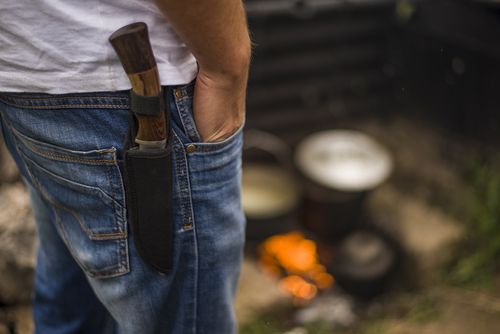Knives are useful tools that can help with important everyday activities such as preparing food and cooking, and they are likely to come in handy if you like to go camping. However, it is important to recognize they can also be dangerous, which is why they established the California knife laws.
They can be the cause of personal injury accidents and the cause of more serious harm if wielded with malice.
It’s easy to understand why they closely monitor knives.
The potential threat they pose is truly substantial. Still, knives are good to have around for activities such as field dressing during hunting or for working on camping-related materials. As long as you are responsible with your knives, they should not present a danger to you or anyone else.
Find out how you can be a more responsible knife owner by learning more about the knife laws in California.
What Knives Are Illegal in California?
Whether or not you can carry a particular knife or even own it in California depends largely on what type of knife it is. While some knives are legal in the state and you can take them to different locations, some types are off-limits. You can get into serious legal trouble if someone sees them on you.
Let’s list what those illegal knives are.
Air Gauge Knives
They design Air gauge knives to look like harmless objects. Or at least that’s the case until you see they are hiding a sharp blade that can be drawn with the aid of gravity or through some other kind of mechanism.
Ballistic Knives
Ballistic knives vary greatly from other types of knives due to its possible uses. The blade of this knife can fire at a target by using a switch.
Butterfly Knives
Also, sometimes referred to as a balisong or a Batangas knife, the butterfly knife stands out from other bladed weapons because of the exposed blade. Once open, the blade of the knife emerges from the handle as if it were fanning out.
Belt Buckle Knives
Hidden in plain sight is the best way to describe belt buckle knives. They are built into the buckle itself to conceal them, and they can draw them easily.
Gravity Knives
They designed the gravity knife to use with one hand. Since you are relying on gravity to draw out the concealed blade, you should easily operate it with one hand.
Spring-Loaded Knives
Often confused with switchblades, spring-loaded knives vary from the former in the way they open. Users will need to apply pressure on a specific stud or portion of the knife to bring out its blade.
Switchblades
Switchblades, as their name implies, can open by pressing a switch. Switchblades can differ from one another in terms of how to draw the blade. Some switchblades have blades that emerge from the front while others draw out from the side.
Those are the main knife types that you cannot own in California, so steer clear of them entirely. Furthermore, knives you can conceal in materials designed to hide them from metal detectors are prohibited.
While you can quibble with whether they still consider them knives, cane swords are illegal in the Golden State.
By the way, you must avoid having any knives mentioned in this section if you are in a motor vehicle in a public or open area, according to the California Legislature.
Selling, loaning, or transferring those knives to another person is also illegal in the state of California.
You can avoid trouble by staying away from them.
Why Are the Mentioned Knives Illegal in California?
The threat level posed by knives can change dramatically depending on who is wielding them. A responsible knife owner and collector may think that imposing limitations on ownership of so many variants of knives are unfair.
However, there is a reason why those particular types of knives are outlawed.
As pointed out by Knife Up, the California laws regarding these bladed weapons are aiming to limit how many weapons criminals may use to commit their nefarious deeds. These are the knives that individuals do not use for other purposes beyond causing physical harm because they are useless as tools.
They also consider these knives mentioned above to be more dangerous because of how easily they can hide them. If someone with bad intentions got a hold of one of those knives, they can inflict serious harm upon another person, and it will be difficult to do something about that until it is too late.

What Knives Can Be Openly Worn but Not Concealed in California?
Next up, let’s talk about the knives that are legal in California, but have restrictions on how you can carry them around.
Because California is an “open carry” state, you can take some knives along with you as long as you position them in a certain way. To be more specific, you will need a sheath and then place the knife in question inside that sheath.
The sheath you use must be suspended from your waist so that people can tell you are carrying a knife.
So, which types of knives are you allowed to carry openly, but not in a concealed manner? These are the knives that are known as daggers and dirks.
A dagger is a short knife with an edged blade. The blade is exposed, so you do not trigger a mechanism before using this particular weapon.
Dirks are similar to daggers and the biggest point of difference between the two may be the fact that the former are more often used by Scottish Highlanders.
For the purposes of California law, both daggers and dirks refer to the same category of bladed weapons.
Now, here’s the tricky part when it comes to California covering daggers and dirks. While you may assume that they only consider a few items as daggers and dirks, the selection can be quite broad.
Larger knives such as the ones used for cooking you can categorize as a dagger or dirk under the law, and the same goes for ice picks. You should also avoid keeping scissors concealed if you have to carry them around because they too can be covered by the state’s knife laws.
What Does Concealed Carry Mean?
We already noted how sheaths are needed if you are going to carry certain knives around with you in the state of California. That’s the right way of carrying certain knives along with you.
But what about the other ways? What are the ways to carry certain knives in the state that can cause you legal troubles?
Concealment can be a broad term, and that makes it difficult to determine right away if carrying a knife is acceptable or prohibited by the law.
To make things simple, we’ll highlight how you shouldn’t carry your knife.
First off, you should avoid putting a knife in your waistband. Placing it there can be considered as concealment, and if you are spotted doing so, expect to be punished accordingly. That’s not even getting into how dangerous it is to carry a knife that way.
Next, you should avoid placing a knife inside your pocket. Aside from helping you follow the law; a sheath is better for maintaining the sharpness of your knife. Feel free to use one.
They do not recommend placing any knife inside a bag or purse. If they find you keeping your knife inside a bag, you may face fines and jail time.
You should also keep the knife in a place where it may not accidentally harm someone because that can lead to you being sued.
What Knives Can Be Carried Openly and/or Concealed?
As you can see, knife laws in California can be quite prohibitive. Interestingly enough, there are certain types of knives that you can carry either openly or concealed.
Pocket knives and non-locking folding knives are among those that can be either openly carried or concealed. The same goes for folding knives as long as they don’t fit the definition of a switchblade that is outlined by the California Legislature.
One key thing to note is that there are still restrictions you need to abide by even if all you have is a pocket knife or non-locking folding knife. The pocket or non-locking folding knife must not have a blade that can be locked into position once exposed. If the blade does lock, then you probably can’t conceal that knife.
Which Places Are Off-Limits for Knives?
It should probably come as no surprise, but there are places where bringing a knife is an absolute no-no.
Schools are among these venues and these include public and private schools along with colleges and universities.
Daggers, dirks, knives with blades longer than two and a half inches, as well as folding knives with blades that can lock into place, are prohibited on school grounds. They also outlaw ice picks and razors that have unguarded blades.
They also ban switchblades and knives that have blades longer than four inches that can lock from public buildings.

How Will You Be Punished if You Violate California’s, Knife Laws?
First, we will discuss the type of punishment they may hand down if they find you in possession of what the state of California defines as a switchblade.
They consider this violation of the law as a misdemeanor and can punish you in two ways.
First, they can sentence you to serve up to six months in the county jail. They can also order you to pay a fine that can reach $1,000.
Concealing a knife that you should only carry openly can be more serious. The penalties will depend on if they charge you with a misdemeanor or a felony. Your criminal history can play a role in determining what charge they levy against you.
A guilty misdemeanor verdict means you may also be sentenced to up to six months in county jail and asked to pay a fine of up to $1,000. If the charge is a felony, the fine can climb up to $10,000 and the minimum amount of time you may spend in county jail is sixteen months.
Bringing an illegal knife to a school or a public building can lead you to be sentenced in longer jail time
Even if they charge you with a misdemeanor, the jail time you serve could still be one year at the least. If that charge is a felony, your sentence could include three years in county jail.
How Do You Defend Yourself Against Accusations That You Violated California’s, Knife Laws?
Violating the knife laws in California can come with some severe penalties. If they accuse you of violating them, it is not a position you want to be in.
You can still defend yourself.
A good case to make is that the knife you were carrying, you were unaware it was prohibited. You can also try to make a case that the knife in your possession is not illegal in the state.
People accused of violating these laws can also attempt to prove that they were carrying their knife in a manner allowed by the law.
Those defenses can work for you in court, but you will need a skilled and experienced attorney by your side to build a good case that will result in your acquittal. Find that attorney by contacting Batta Fulkerson as soon as possible.
The attorneys at that law firm are well-versed in California knife laws, and they will keep you from facing any unfair punishment. Reach out to them now and see how they can help.




